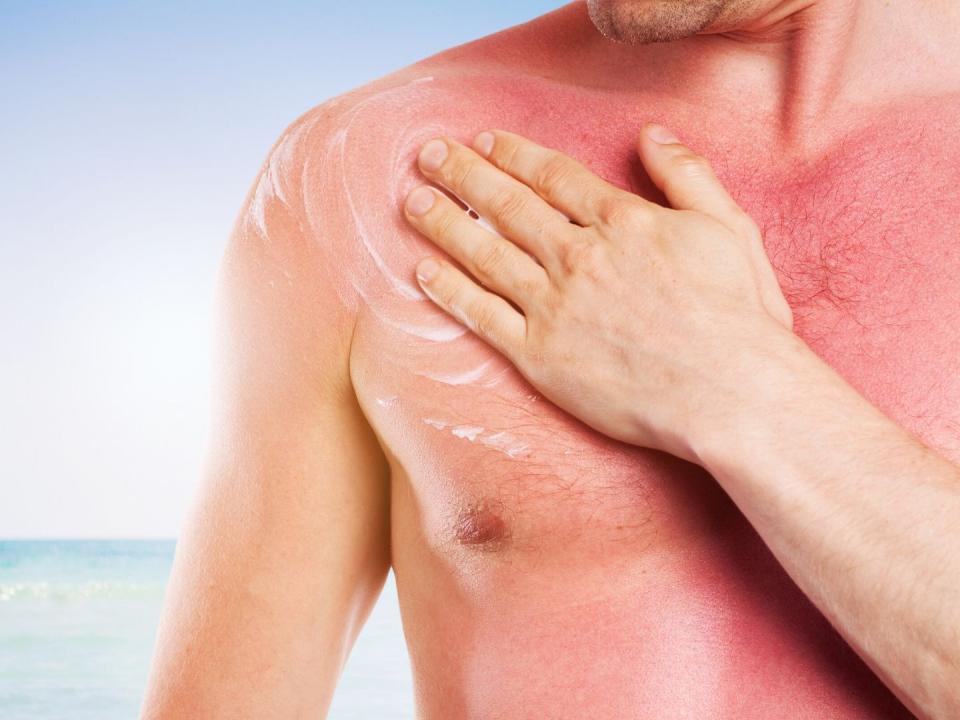
A third of people underestimate the threat posed by the Irish sun and are ‘not at all worried’ about sunburn in Ireland, new research from the Irish Cancer Society has revealed.
As the country enters into extreme weather temperatures, the survey also found that while just a third would apply sun cream regularly, nearly 1 in 7 would never apply sun cream when in Ireland. This rises to 1 in 5 amongst men.
The survey of 1,000 people, conducted by Core Research on behalf of the Irish Cancer Society also revealed that half of the people surveyed disregard the importance of protecting the head, eyes and face from damaging rays with 53% of those surveyed admitting that they never wear a wide-brimmed hat and 1 in 6 never wearing sunglasses.
Skin cancer is the most common cancer in Ireland, with over 13,000 new cases each year, a figure that the National Cancer Registry of Ireland (NCRI) expects to double by 2040.
Getting sunburnt is a sign that cell DNA has been damaged by UV rays and this damage can lead to skin cancer.
Commenting on the research, Kevin O’Hagan, Cancer Prevention Manager with the Irish Cancer Society, said: “Nearly nine out of every 10 cases of skin cancer are caused by UV rays from the sun or sunbeds. Sun safety is vital and that means protecting your skin, wherever you are and following the SunSmart code. Even on cloudy days in Ireland, UV rays can damage skin cells. Taking steps like applying sunscreen, covering up by wearing a hat and sunglasses and seeking shade can reduce your risk of skin cancer. Knowing your local UV index is also important, as when the UV index is higher than 3, you need to protect your skin.”
’It's very important for people to remember that ‘Irish’ sunshine can still cause damage.
Skin cancer survivor Rachel Wynne says people need to be aware of the importance of protecting their skin, even if they’re spending the summer at home: “I noticed a mole on my leg had changed. After a wide leg incision and a biopsy, I was diagnosed with melanoma. Thankfully, it hadn’t spread but this was a very frightening time for my family and me. I’ve since had other moles removed and I will continue to see my dermatologist for the rest of my life.
"I am now vigilant about using sun cream. I always make sure to cover up in the sun, including wearing a hat and regularly reapplying a Factor 50 cream whether that’s at home or abroad. Protecting your skin shouldn’t begin only when you step off a plane in another country because the damage caused by UV rays which can lead to skin cancer can just as easily happen in Ireland. As someone who works in the beauty industry, I see how some people are obsessed with getting a tan to look good but if they could see the scars that I have following surgery, they would think again.”
Dr Aoife Lally, Consultant Dermatologist at St Vincent's University Hospital, said: “It’s very important for people to remember that ‘Irish’ sunshine can still cause damage. Every year when there is good weather, a significant number of patients come to their clinic appointments sunburnt. They usually don't realise that sun protection measures are required in Ireland as well as abroad. It is important to emphasise sun protection involves more than applying sun cream — follow the SunSmart code.”
Dr Bláithín Moriarty, Consultant Dermatologist at St Vincent’s University Hospital, said: “The majority of the referrals I receive are for suspected skin cancer, a statistic which is consistent across the country. In Ireland, we are extremely genetically susceptible to skin cancer and although traditionally we have been less cautious with UV protection, we now understand that UV rays are a WHO class 1 carcinogen, meaning that exposure causes malignancy. This effect is not immediate and may not be seen for decades after the exposure. Protecting our skin from UV radiation by following the SunSmart code will reduce our skin cancer rates.
“When identified early, skin cancer may be managed with straightforward surgical procedures. However, for later stages of the disease, treatment is more complicated and patient outcomes are worse. It’s important for us to understand that we are all at risk but that careful protection mitigates this risk substantially. During this bright spell and anytime that the UV index is 3 or above when in Ireland or overseas, we all need to take SunSmart protection seriously.”
Contact the Irish Cancer Society Support Line
If you have worries or concerns about cancer, you can speak confidentially to an Irish Cancer Society Cancer Nurse through the Freephone Support Line on 1800 200 700.
Monday to Friday, 9.00am - 5.00pm
For more information
Phone
1800200700
